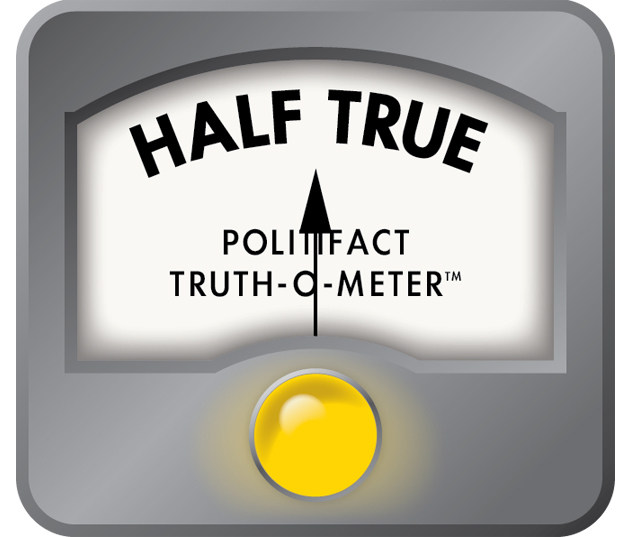Stand up for the facts!
Our only agenda is to publish the truth so you can be an informed participant in democracy.
We need your help.
I would like to contribute
Warren overstates share of tax cuts for the rich
In her first extended interview after saying she’d run for president, Democratic Massachusetts Sen. Elizabeth Warren took on the Republicans’ 2017 tax bill.
Warren told MSNBC host Rachel Maddow that the package was a $1.5 trillion gift to "billionaires and corporations." Warren said that legislative push held Republicans together, regardless of what else they might think about President Donald Trump.
"He's a little louder and (they) don't like the tweet thing and the whole foreign policy seems to be a disaster," Warren said Jan. 2. "But hey, the rich folks got $1.5 trillion."
The Republican Tax Cut and Jobs Act is certain to be a recurring theme throughout the presidential campaign, so we wanted to look closer at whether it gave "rich folks" $1.5 trillion.
• The $1.5 trillion is one main government estimate of the net rise in deficits due to the tax act over 10 years. The Congressional Budget Office now predicts deficits will go up almost $1.9 trillion.
Sign up for PolitiFact texts
• Based on estimates from Congress’s Joint Committee on Taxation, about half of the tax cuts would flow to the top 10 percent of taxpayers, or those making $200,000 or more.
• That means the amount of money going to "rich folks" would range from $750 billion to nearly $1 trillion, depending on whether you use the $1.5 trillion or the $1.9 trillion estimate.
The 2017 Tax Cut and Jobs Act made temporary cuts in individual tax rates, and permanent cuts in corporate tax rates. In round figures, for ordinary wage income, the tax rate dropped about two percentage points, from about 29 percent down to 27 percent. On the corporate side, the maximum rate fell from 35 percent to 21 percent.
Congress also changed the rules for estate taxes, temporarily raising the tax-exempt limit from $5.5 million to $11 million. Both the individual and estate tax changes end in 2025.
Most of the initial estimates of what lies ahead stop at 2027, because that’s the budget time frame set by law.
In order to assess Warren’s claim, we need two things: the total cost of the tax cuts and a table showing how those dollars are expected to flow to different income groups. The nonpartisan congressional Joint Committee on Taxation delivers both.
Based on the joint committee’s estimate of a $1.5 trillion cut, here’s how the money would be spread around.
There’s no hard and fast rule to say who is rich, but households making $200,000 a year or more roughly account for the top 10 percent. In this chart of tax law benefits, they get 52 percent of the cuts. We ran this by Howard Gleckman, senior fellow at the Tax Policy Center, a project of the Urban Institute and the Brookings Institution.
"Using the joint committee numbers, it is reasonable to make the split at $200,000, and the numbers show they get about half the tax cut," Gleckman said.
The Tax Policy Center ran its own model of how the tax law would play out. The results were about the same as the joint committee’s.
"High income people get much of the benefit, but far from all of it," Gleckman said.
Economist Harvey Rosen at Princeton University called the 50/50 split "a reasonable guess."
Alan Auerbach, a University of California-Berkeley economist agreed, saying "ultimately, rough estimates are about all we can do."
And he cautioned against looking at the corporate tax cuts as a thing unto themselves, as Warren seemed to do when she talked about the cuts as a gift to "billionaires and corporations." At the end of the day, he said, that money goes to individuals.
"No economist would say a corporation is a beneficiary of a tax cut, in terms of its ultimate impact, since corporations aren't people. That term, presumably, is a short-hand for those associated with corporations, but it leaves unclear exactly whom, whether that’s corporate executives, corporate shareholders, but also perhaps corporate employees."
(The individual tax cuts reduced revenues by $1.1126 trillion, and corporate tax cuts reduced them by $653 billion, or about half as much.)
Both the joint committee and the Tax Policy Center fold in the corporate cuts when they estimate the impact on people.
The committee estimated the total costs of the cuts in two ways – one before looking at the effect of the cuts on the economy, and one after factoring in those effects. Without the economic effects, the tax law will result in an estimated $1.456 trillion in lower revenues by 2027. After factoring in the economic impact, the figure drops to $1.071 trillion.
Featured Fact-check
But the committee only estimated how tax payments would go up or down for each income group using the bigger number, about $1.5 trillion, and only for the odd-numbered years — 2019, 2021, 2023, 2025 and 2027.
We took the trends across those years and applied them to the total estimated tax reduction to estimate the share of the tax cuts going to each group.
Warren campaign spokeswoman Kristen Orthman raised some issues with our findings.
"The Congressional Budget Office has already said the total cost will be $1.9 trillion, not $1.5 trillion," Orthman said. "And the Joint Committee on Taxation distributional analysis does not account for major giveaways to the rich, like the tax bill's estate tax cuts. Even if only half the benefits go to people making more than $200,000, that's still well over a trillion dollars."
The Congressional Budget Office did raise its estimate. Auerbach and Gleckman were of mixed minds on how to treat that. Auerbach said the distribution pattern would probably be about the same and the wealthier households would end up with about $950 billion.
Gleckman was less comfortable.
"If you are going to hang your distributional analysis on the Joint Committee on Taxations’ estimates, you also should use its revenue estimates," he told us. "Otherwise you’ll be trying to mix-and-match data, which will only get you in trouble."
Orthman also noted that the joint committee did not factor in the change in the estate tax. The committee said that provision would cost $83 billion over 10 years. Given that this applies only to estates worth between $5.5 and $11 million, it’s likely that the beneficiaries would be well-to-do themselves. At least some of that $83 billion should be added to the $950 billion based on the CBO figure, Warren’s office said.
That’s reasonable, but it doesn’t change the picture much. None of this is based on pinpoint accuracy. It’s fair to say that based on those assumptions, higher income households would get about $1 trillion.
Finally, the Tax Foundation, a business-backed research group, took a different approach altogether. It looked not at whether taxes rose or fell, but how after-tax incomes changed. It found that every income group would be better off.
Warren said that under the Republican tax law, "the rich folks got $1.5 trillion." During much of the tax cut debate, $1.5 trillion has been a shorthand measure of the ultimate cost of the bill.
Looking at how the tax cuts are spread around, there’s broad agreement that higher income people do best. Those making $200,000 or more get about half of the cuts.
There’s room to argue that a 50/50 split means those people get about $750 billion to $1 trillion over 10 years. But no model predicts they would get as much as Warren said, nor that they get all of the benefits.
She exaggerated the gains for the well-to-do. We rate this claim Half True.
Our Sources
MSNBC, The Rachel Maddow Show, Jan. 2, 2019
Joint Committee on Taxation, Estimated Budget Effects Of The Conference Agreement For H.R.1, The Tax Cuts And Jobs Act, Dec. 18, 2017
Joint Committee on Taxation, Macroeconomic Analysis Of The Conference Agreement For H.R. 1, The Tax Cuts And Jobs Act, Dec. 22, 2017
Joint Committee on Taxation, Distributional Effects Of The Conference Agreement For H.R.1, The Tax Cuts And Jobs Act, Dec. 18, 2017
Congressional Budget Office, The Budget and Economic Outlook: 2018 to 2028, April 9, 2018
Congressional Research Service, The 2017 Tax Revision (P.L. 115-97): Comparison to 2017 Tax Law, Feb. 6, 2018
Tax Policy Center, Distributional analysis of the Conference Agreement for the Tax Cuts And Jobs Act, Dec. 18, 2017
Tax Policy Center, Macroeconomic analysis of the Tax Cut and Jobs Act, Dec. 20, 2017
Congressional Budget Office, The Effects of the 2017 Tax Act on CBO’s Economic and Budget Projections, April 2018
Congressional Budget Office, Distributional Effects of Changes in Taxes and Spending Under the Conference Agreement for H.R. 1, Dec. 21, 2017
Alan Auerbach, Laurence Kotlikoff and Daryl Koehler, The new tax bill: Winners and losers, June 29, 2018
Tax Foundation, The Distributional Impact of the Tax Cuts and Jobs Act over the Next Decade, June 28, 2018
U.S. Census Bureau, Wealth, Asset Ownership, & Debt of Households Detailed Tables: 2014, Sept. 17, 2018
U.S. Federal Reserve, Changes in U.S. Family Finances from 2013 to 2016: Evidence from the Survey of Consumer Finances, September 2017
Kiplinger, Millionaires in America: All 50 States Ranked, July 19, 2018
Phoenix Marketing International, Millionaires by U.S. metro area 2016, Aug. 29, 2017
Tax Policy Center, Baseline Distribution of Income and Federal Taxes, by Expanded Cash Income Level, 2011 - 2028, Aug. 23, 2018
Tax Policy Center, Baseline Distribution of Income and Federal Taxes, All Tax Units, by Expanded Cash Income Level, 2017, Aug. 23, 2018
Email interview, Howard Gleckman, senior fellow, Urban Institute - Tax Policy Center, Jan. 7, 2019
Email interview, Alan Auerbach, professor of economics and law, University of California-Berkeley, Jan. 7, 2019
Email interview, Harvey Rosen, professor of economics, Princeton University, Jan. 8, 2019
Interview, Chris Hayden, communications staff, Warren for President, Jan 8, 2019
Browse the Truth-O-Meter
More by Jon Greenberg
Warren overstates share of tax cuts for the rich
Support independent fact-checking.
Become a member!
In a world of wild talk and fake news, help us stand up for the facts.










 PolitiFact Rating:
PolitiFact Rating: 















































